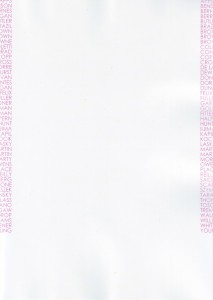ON Contemporary Practice Volume 2
BY Thom Donovan
 For anyone out in the Bay Area tomorrow night, coeditors Michael Cross and Kyle Schlesinger, and a critical mass of Bay Area contributors will launch ON Contemporary Practice 2 at Moe’s Books in Berkeley.
For anyone out in the Bay Area tomorrow night, coeditors Michael Cross and Kyle Schlesinger, and a critical mass of Bay Area contributors will launch ON Contemporary Practice 2 at Moe’s Books in Berkeley.
When Michael, Kyle, and I conceived of the journal about two and a half years ago it was at the Tile Bar in the East Village after a tribute event for Hannah Weiner at St. Mark’s Church. Over drinks, we started to talk about the need for a magazine where contemporaries (and younger and emergent poets in particular) could discuss each other’s practices beyond the review format. By the end of our conversation we had agreed to draw up a list of 300 practitioners with whom we would like to be in touch and publish.
The launch tomorrow features readings by David Brazil, editor of Try! magazine and coeditor of the recent Kenning Editions Anthology of Poets Theater (with Kevin Killian). David’s contribution to ON2 concerns the translation practice of Brandon Brown (a hot topic of debate in a recent Harriet post). Brandon, who wrote on “voice” as a site of identity after the work of the Cincinnati-based poet Dana Ward in ON1, will also be reading. Taylor Brady, coauthor of Snow Sensitive Skin with Rob Halpern and a handful of other must read books including the Atelos published Occupational Treatment, has a wonderful essay on Yedda Morrison’s 2008 Displaced Press book, Girl Scout Nation, one of my very favorite books of poetry from the aughts. The essay, which reads less like prose and more like a kind of lyrical negative dialectics (on par with Fred Moten’s own prose in his book In the Break), takes up the problem of ecology and gender in Morrison’s work—a prominent line of inquiry both in Morrison’s 2001 Kelsey Street book Crop, Girl Scout Nation, and in her recent Little Red Leaves artist’s book, Darkness (Chapter 1), in which she erased many of the words from Joseph Conrad’s Heart of Darkness to reveal Conrad's preoccupations with natural fact and engendered landscapes. In ON2, Robin Tremblay-McGaw has an excellent essay addressing Jocelyn Saidenberg’s Atelos book Negativity, a book which takes up problems of identity at the edge of community-formation, friendship, and erotic encounter. Saidenberg, who herself has yet to contribute to ON (but who has an open invitation), will also be presenting. Dan Thomas-Glass writes on Bay Area publishing, including Suzanne Stein’s San Francisco-based press project, TAXT, a chapbook press that has put out titles by Brandon Brown, David Buuck, Eleni Stecopoulos, and Stefani Barber among many others. Stein will read with Alli Warren, with whom she published some of her correspondence in ON1. Lastly, Laura Moriarty, the deputy director of Small Press Distribution, has published a journal-style essay about her reactions to reading Rob Fitterman’s and Vanessa Place’s Notes on Conceptualisms and to the reception of the book around the Bay Area. Michael Cross, who I imagine will be reading from his contribution as well, has written an essay which I find incredibly useful treating the work of Judith Goldman and Jennifer Scappettone through Joseph Beuys’ notion of “social sculpture.”
Other contents of ON2 include Rosa Alcalá writing about questions of identity and performance in Mónica de la Torre’s Roof book, Public Domain, Stan Apps on Stephanie Young's Picture Palace and experimental memoir, Cara Benson on Susana Gardner's poetics, Laynie Browne on Lee Ann Brown's intermedia poetics, CA Conrad’s and Brenda Iijima’s second installment of their correspondence about the “poetics of dirt,” Corina Copp on poets theater with special reference to the work of Rodrigo Toscano, Robert Dewhurst on Dorothea Lasky's poetics, myself on Bhanu Kapil's radical autobiographical practice, Patrick James Dunagan on Edmund Berrigan’s, Jeff Karl Butler’s, and John Coletti’s poetics in relation to one another, Joel Felix on the career of Chicago-based poet William Fuller, Robert Kocik about (trans) gender and transmigration in Stacy Szymaszek’s recent Litmus Press book Hyperglossia, Chris Martin writing ecstatically on John Coletti, a stunningly paced essay by Austin-based poet C. J. Martin thinking about cosmetic imagery in Rob Halpern’s poetry, Buffalo-based poet Rich Owens on Flarf and Conceptual writing, Evelyn Reilly on contemporary women’s writing after Rosmarie Waldrop, Michelle Taransky on Stacy Szymaszek’s poetics, Brian Whitener on bearing witness to violence against women in Mexico City-based poet Dolores Dorantes’ work, and Tyrone Williams with a long overdue essay about Erica Hunt’s poetics.
What has been rewarding about co-editing ON so far is to be in touch with the contributors, and to genuinely feel like a set of tendencies in contemporary poetry is becoming more visible and legible through a magazine project. What’s more, seeing names recur in the table of contents, feeling as though, for lack of a better term, there is a certain company one is keeping, and that one's company is listening to itself across gaps in geographical and cultural space. Wishing so much I could be at Moe’s tomorrow with many of my friends and colleagues and (dare I say it!)—community. If anyone knows of a good place to launch in NYC, ON is still looking for a place to crash for a night.
Thom Donovan lives in New York City where he edits Wild Horses of Fire weblog (whof.blogspot.com) and...
Read Full Biography

